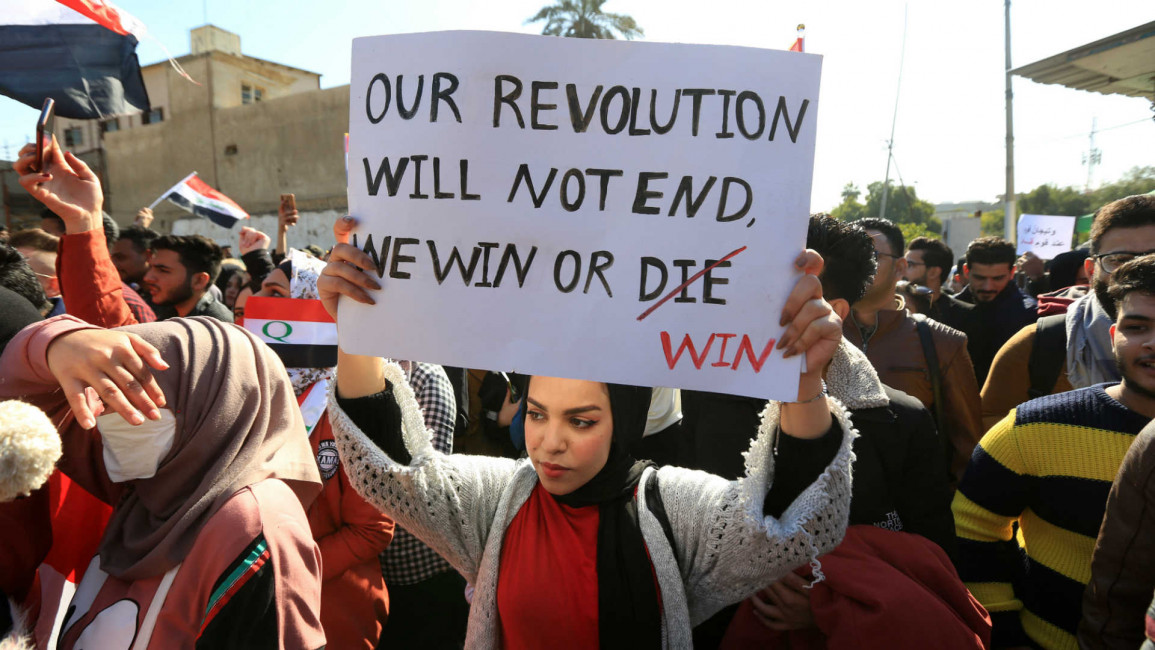Prominent Iraqi cleric Sadr calls on followers to clear protest camps after new PM appointed
President Barham Saleh on Saturday named former Communications Minister Mohammad Allawi prime minister, but furious protesters have rejected the designation, which they say was directed by the very political elite demonstrators have been trying to oust since October last year.
If he can form a government within a month, Allawi will replace unpopular Adel Abdel Mahdi who resigned under growing street pressure two months ago.
Sadr - an extremely influential cleric who has alternately sided with both anti-government protesters and the Iran-backed political factions demonstrators despise - has told his supporters known as "blue hats" to help authorities clear the streets and ensure schools and businesses operate normally again.
"I advise the security forces to stop anyone from cutting off roads and the ministry of education should punish those who obstruct regular working hours, be they students, teachers or others," the cleric said on Twitter.
"The revolution must go back to being restrained and peaceful," he added.
His message to the "blue hats" on Sunday came a day after some of his supporters, armed with batons, attacked an abandoned building in Baghdad's central Tahrir square, the epicentre of Iraq's protest movement.
The skeleton building popularly known as the "Turkish Restaurant" has been occupied by demonstrators since October.
The structure had become a symbol of the uprising, featuring portraits of young men shot dead in the rallies and huge banners listing reforms protesters wanted to see.
Sadr's supporters reportedly forced protesters out of the building, "shouting that we didn't do any good to the country except ruining its economy", Rassoul, a 20-year-old demonstrator who has been living in the Turkish Restaurant since October, told Reuters.
Although anti-government protests continued nearby, the Turkish Restaurant was empty on Sunday. It was being patrolled by "blue hats", who stood outside its gates pacing with walkie-talkies. Protest banners had been removed from the building.
Sadr's supporters have at times stood by the protesters, sometimes protecting them from attacks by security forces and unidentified gunmen.
In previous years, the cleric has been at the helm of anti-government unrest but found himself unable to control the trajectory of the recent demonstrations. Many protesters oppose him as they do the rest of Iraq's political class.
Allawi's designation after months of disagreement between political factions came about as part of a deal between Sadr and Iran-backed groups.
Read more: In 2020, Arab citizens and states will step up epic battle to define the region
"Muqtada al-Sadr sent conflicted messages since the beginning but at the end he made it clear that he's against the protesters," protester Malek Jawad told Reuters.
 |
| [Click to enlarge] |
"Allawi is a member of the political game that has destroyed Iraq, he needs to go."
Mass rallies have rocked Baghdad and Iraq's Shia-majority south since October, with protesters demanding snap elections and an independent prime minister as well as accountability for corruption and recent bloodshed.
Prime minister-designate Allawi has pledged to meet some of the protesters' demands.
Allawi has pledged early elections and promised to hold "aggressors and criminals" responsible for the killing of more than 600 protesters responsible.
"The state's weapon will not be held against the people. The state's weapon is to protect the people, maintain borders, and promote national dignity," he said on Saturday evening.
"I pledge to protect the electoral process and stand against any interference that might affect the integrity, fairness, and transparency of its results and to restore the public's confidence in it," he added.
Demonstrators have not yet been impressed, however.
"We are here to reject the new prime minister because he has a well-known history within the political class," 22-year-old university student Tiba told AFP.
"Naming Mohammad Allawi is a mockery," said a demonstrator in the southern city of Diwaniyah.
"It represents a total disregard for those killed in the protests and for the demands of the Iraqi people who have been demonstrating for four months to reject parties affiliated with Iran," the protester said.
Agencies contributed to this report.



